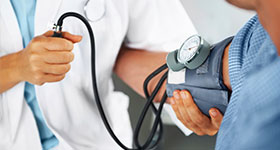How to Prevent Heart Disease
Get trusted guidance on what you can do to take care of your heart.
Early Heart Attack Signs
Early heart attack signs can be subtle — especially in women.
5 Ways to Reduce Your Heart Disease Risk
Keep your heart healthy, no matter your age or family history.
Cooking for Heart Health
Try these tasty tips to make heart-healthier meals at home.
Featured Articles

Four Health Numbers You Should Know
The four numbers that reveal crucial information about your health, and what you can do to improve them.

Early Signs of a Heart Attack
Some symptoms occur months before a heart attack; some are quite mild. Learn about the warning signs to watch.

How to Lower Your Blood Pressure Naturally
By changing a few daily habits, you may be able to control your blood pressure without medication.
Heart Health Resources
Spanish
Vivir con insuficiencia cardiaca (PDF)
Monitorear su peso, presion arterial y frecuencia cardiaca (PDF)
Actividad y ejercicio diarios (PDF)
Medicamentos para la insuficiencia cardiaca (PDF)
Habitos saludables para dormir mejor (PDF)
Reduzca el consumo de sodio para tener una mejor salud (PDF)
Opciones de alimentos con bajo contenido de sodio (PDF)
Ask an Expert
Nobl Barazangi, M.D., Ph.D.
Sutter Pacific Medical Foundation
What are the effects of hormone replacement therapy on a person who has a history of lacunar stroke?
Hormone replacement therapy (HRT) has been shown to increase the risk of ischemic stroke (lacunar stroke is a subtype of ischemic stroke). Although the absolute risk of complications such as stroke is relativel... continue reading about What are the effects of hormone replacement therapy on a person who has a history of lacunar stroke?
Ask the Expert Team
Sutter Health
I have my heart disease under control with diet and medication. Can work stress have a negative impact on my heart? If so, what can I do?
There are known and frequently discussed risk factors for “heart disease”. These range from dietary habits (such as sodium intake) to disease states (such as hypertension). Stress is not a confirmed... continue reading about I have my heart disease under control with diet and medication. Can work stress have a negative impact on my heart? If so, what can I do?
Deborah Kurzrock, R.D.
Mills-Peninsula Medical Center
What's a bigger dietary cause of high cholesterol -- animal protein like eggs and meat, or high-sugar foods and simple carbs? Seems like I'm hearing a lot more about the harm of sugar these days.
Keeping your heart healthy is complicated. Many factors contribute to your risk of heart disease, including genetics, diet, physical activity and stress. Here are some tips to help you lower your blood choleste... continue reading about What's a bigger dietary cause of high cholesterol -- animal protein like eggs and meat, or high-sugar foods and simple carbs? Seems like I'm hearing a lot more about the harm of sugar these days.
Ask the Expert Team
Sutter Health
An MRI test showed a fat pad on the tip of my heart. Will this go away by itself?
That sounds like a pericardial fat pad, which is a small lump of fatty tissue on the outside of the heart. Cardiologists generally consider it of little or no significance. It does not affect your heart functio... continue reading about An MRI test showed a fat pad on the tip of my heart. Will this go away by itself?
Gary F. Milechman, M.D.
California Pacific Medical Center
I'm having chest pains, but all my tests related to the heart have come up clear. What could be the causing this pain?
Your question is at the heart of an important and common issue that cardiologists deal with regularly. When is chest pain a serious problem related to the heart? When is chest pain from something other than the... continue reading about I'm having chest pains, but all my tests related to the heart have come up clear. What could be the causing this pain?
Richard H. Hongo, M.D., FACC
Sutter Pacific Medical Foundation
My heart has been skipping and I'm feeling dizzy. I went in for testing and was diagnosed with second degree heart block. The doctor said that if it goes to third degree, he might suggest a pacemaker. What can I do to avoid moving to third degree?
When the heart beat starts to slow down, or when the conduction starts to block every so often, sometimes it is because a medication is stressing the heart's electrical system. If there are no medications to ac... continue reading about My heart has been skipping and I'm feeling dizzy. I went in for testing and was diagnosed with second degree heart block. The doctor said that if it goes to third degree, he might suggest a pacemaker. What can I do to avoid moving to third degree?
Richard H. Hongo, M.D., FACC
Sutter Pacific Medical Foundation
Are heart palpitations a serious symptoms for someone 62 years old and in good physical shape? My PCP did an ECG and a Holter monitor exam, and suggested I see a cardiologist. Do I need to?
In general, heart palpitations are not a serious problem as long as the heart is healthy. Being in good physical shape and staying active are good signs that the heart is indeed healthy. There are times, howeve... continue reading about Are heart palpitations a serious symptoms for someone 62 years old and in good physical shape? My PCP did an ECG and a Holter monitor exam, and suggested I see a cardiologist. Do I need to?
Larry K. Fan, M.D.
California Pacific Medical Center
If I get liposuction to get rid of my belly fat, will I reduce the health risks associated with being "apple" shaped?
Liposuction is a great way to contour and reshape the body (including the belly) by removing unwanted fat. Unfortunately, liposuction is not a treatment for weight loss, nor does it appear to influence the risk... continue reading about If I get liposuction to get rid of my belly fat, will I reduce the health risks associated with being "apple" shaped?
Ask the Expert Team
Sutter Health
Does salt raise blood pressure?
In excess, yes. The numbers:1 gram (1,000 mg) sodium = 2.5 gram of salt = 1 teaspoon of table saltHarmful = more than 5-6 grams, and probably less than 1.5 grams a dayAmerican Heart Association recommendation =... continue reading about Does salt raise blood pressure?
More Resources
Healthwise Resource Library
Look up helpful health information.
Patient Information
Practical info for Sutter patients.
Tools and Quizzes
Online tools to help you make decisions about your health.









